Firstly, Sun Salutations, or Surya Namaskar, are a series of yoga poses that are traditionally practiced at the beginning of a yoga practice to warm up the body and focus the mind. Additionally, the sequence is a combination of forward and backward bends, and is meant to honor the sun, which is considered a symbol of the divine in many yoga traditions. Altogether, in this blog, we will provide a step-by-step guide to Sun Salutations, including modifications for beginners and tips for advanced practitioners.
Guide to Sun Salutations
Step 1: Mountain Pose (Tadasana)
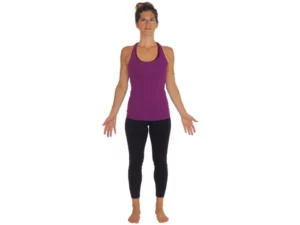
Firstly, Begin standing at the front of your mat with your feet hip-width apart, arms at your sides, and palms facing forward. Simultaneously, engage your core and lengthen through your spine. During this pose, take a few deep breaths here, feeling the ground beneath your feet.
Step 2: Upward Salute (Urdhva Hastasana)
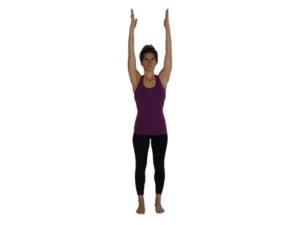
Secondly, on an inhale, sweep your arms up overhead, keeping your shoulders relaxed and your gaze lifted. During this pose, reach your fingertips towards the sky, feeling a stretch in your side body.
Step 3: Standing Forward Fold (Uttanasana)
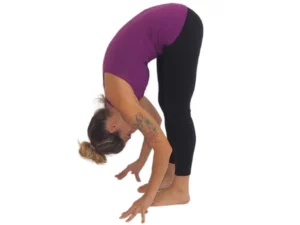
Thirdly, on an exhale, hinge at the hips and fold forward, reaching your hands towards the ground. Bend your knees as much as needed to feel a stretch in the hamstrings, and allow your head and neck to relax.
Step 4: Halfway Lift (Ardha Uttanasana)
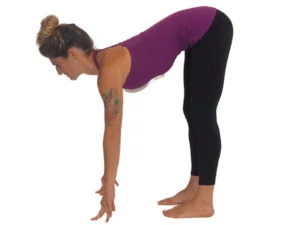
Fourthly, on an inhale, lift halfway up, lengthening through your spine and bringing your hands to your shins. Simultaneously, keep your gaze forward and your shoulders relaxed.
Step 5: Plank Pose
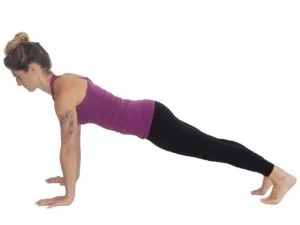
Additionally, on an exhale, step or jump your feet back into plank pose, with your hands under your shoulders and your body in a straight line. Simultaneously, engage your core and press through your fingertips.
Step 6: Chaturanga Dandasana (Four-Limbed Staff Pose)
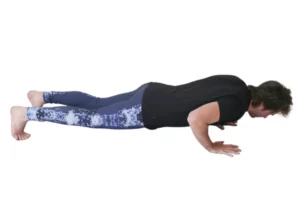
Additionally, from plank pose, exhale and lower down into a push-up position, with your elbows bent and your body hovering a few inches off the ground. Keep your elbows close to your body and your shoulders lifted.
Step 7: Upward-Facing Dog (Urdhva Mukha Svanasana)
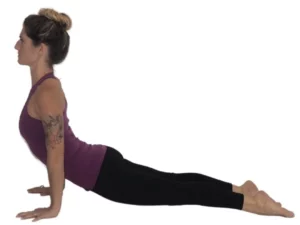
From Chaturanga, inhale and roll over your toes, pressing into the tops of your feet and your palms to lift your chest and gaze up towards the sky. Keep your shoulders relaxed and your core engaged.
Step 8: Downward-Facing Dog (Adho Mukha Svanasana)
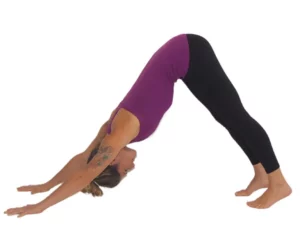
On an exhale, lift your hips up and back, coming into downward-facing dog. Spread your fingers wide and press into your palms and the balls of your feet. Keep your knees bent as much as needed to lengthen through your spine.
Step 9: Standing Forward Fold (Uttanasana)
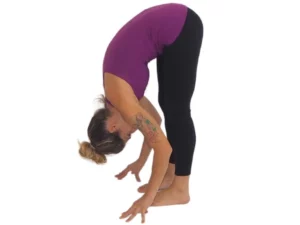
On an exhale, step or jump your feet towards your hands and fold forward, reaching your hands towards the ground. Bend your knees as much as needed to feel a stretch in the hamstrings, and allow your head and neck to relax.
Step 10: Upward Salute (Urdhva Hastasana)
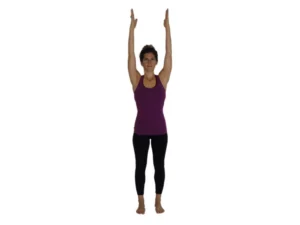
On an inhale, sweep your arms up overhead, keeping your shoulders relaxed and your gaze lifted. Reach your fingertips towards the sky, feeling a stretch in your side body.
Step 11: Mountain Pose (Tadasana)
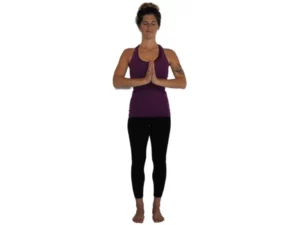
On an exhale, lower your arms and return to mountain pose, standing tall with your feet hip-width apart.
Modifications for Beginners:
For beginners or those with limited mobility, there are several modifications that can be made to make Sun Salutations more accessible:
Instead of stepping or jumping back into plank pose, you can drop down onto your knees and then lower into Chaturanga.
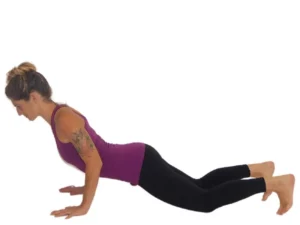
However, instead of coming into upward-facing dog, you can modify this pose by coming into cobra pose, where you keep your elbows close to your body and your hips on the ground as you lift your chest and gaze towards the sky.
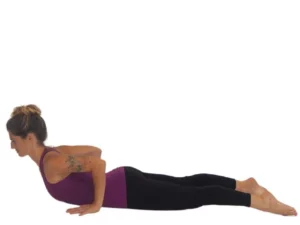
In downward-facing dog, you can bend your knees as much as needed to keep your spine long and comfortable.
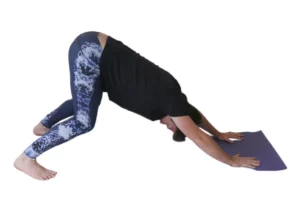
Tips for Advanced Practitioners:
Additionally, for advanced practitioners, there are several ways to deepen your Sun Salutation practice and challenge yourself:
Try jumping back from Uttanasana to Chaturanga instead of stepping back, keeping your body in a straight line as you jump.
In Chaturanga, lower down to hover just a few inches off the ground before coming into upward-facing dog.
In downward-facing dog, lift one leg up towards the sky for three-legged dog, and then transition into low lunge or warrior I.
Benefits of Sun Salutations:
Lastly, Sun Salutations offer a number of benefits for the mind and body, including:
- Warming up the body and increasing blood flow
- Strengthening and stretching the muscles, particularly in the legs, arms, and core
- Improving flexibility in the spine and hips
- Calming the mind and reducing stress and anxiety
- Improving digestion and promoting detoxification
Sun Salutations can be practiced on their own or as a warm-up before other yoga poses or exercises. They can also be modified to suit different levels of fitness and mobility. As with any yoga practice, it is important to listen to your body and work within your own limits to avoid injury.
In conclusion, Sun Salutations are a versatile and accessible sequence of yoga poses that offer numerous physical and mental benefits. Whether you are a beginner or an advanced practitioner, there are modifications and variations that can be made to suit your individual needs and goals. By incorporating Sun Salutations into your regular yoga practice, you can improve your strength, flexibility, and overall well-being.
Want to learn more about Yoga Asana?
Check out Soma Yoga Institutes Worldwide and Online Trainings!